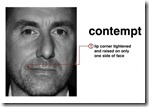 How our partner reacts to us is based on what we say verbally as well as what we communicate through our body language and facial expressions. John Gottman, in his more than 30 years of research on couples, says that failing relationships can be spotted within 5 minutes of observing the couple. In fact, the body language we use around our partner on a regular basis, especially when we are in the middle of a fight, says a lot about the health of a relationship.
How our partner reacts to us is based on what we say verbally as well as what we communicate through our body language and facial expressions. John Gottman, in his more than 30 years of research on couples, says that failing relationships can be spotted within 5 minutes of observing the couple. In fact, the body language we use around our partner on a regular basis, especially when we are in the middle of a fight, says a lot about the health of a relationship.
Here are some common examples of body language used regularly in an unhealthy relationship during arguments:
Bored or don’t care what your partner is saying
Drumming your fingers
Crossing your legs with one food kicking
Having a blank stare
Doodling or writing
Humming while your partner is talking
Not caring is a sign that your relationship is dangerously close to failing and needs immediate attention. Take a break from the conversation and think about why you are not interested in what yoru partner has to say. When did that start and are you interested in improving it? Consider seeing a couple’s therapist to mend your relationship as soon as you can.
Defensive
When our partners criticize us, our bodies cannot distinguish between an emotional attack and a physical one. We act in a way to literally protect our bodies. Here’s how to know if you are feeling defensive.
Arms crossed over chest
Crossing legs
Hands in fist
Moving to create more space between you and your partner (e.g. sitting father apart on the sofa)
Moving to put an object between you and your partner (e.g. standing to the opposite side of the table)
Raising your hand as if to tell your partner to “stop”
Shoulders will shrink & look down (as a sign that the criticism made us feel small)
Raised voice
Avert gaze from partner
Sitting, turned away from your partner
Defensiveness is one part of a four-part damaging cycle that unhealthy relationships get into. If you notice yourself becoming defensive, avoid the urge to react and instead explain respectfully to your partner that you felt criticized by what they said. If they can’t back down or reword their complaint or you can’t control your defensiveness, walk away for 20 minutes until you both calm down.
Contempt
 Contempt is a natural, yet detrimental, reaction to defensiveness. To save your relationship from unhealthy patterns, identify when you are feeling contempt and then try to understand what happened in your conversation that caused you to feel this way. For some, they may realize that they regularly feel contempt in their relationship, a sign that the marriage may be very close to failing.
Contempt is a natural, yet detrimental, reaction to defensiveness. To save your relationship from unhealthy patterns, identify when you are feeling contempt and then try to understand what happened in your conversation that caused you to feel this way. For some, they may realize that they regularly feel contempt in their relationship, a sign that the marriage may be very close to failing.
Sneering
Having a look of disgust on your face
Tightening mouth
Avoiding looking at your partner
Rolling eyes
Waving your hand as if to wave off something you don’t like
Narrowing eyes or squinting
Nostrils flare
Shaking your head, usually in disgust
Frustration
Arguments can be exasperating and can create high levels of frustration, especially if we want our partners to do something they won’t do or we feel misunderstood. Here are signs you are frustrated:
Short breaths
Clicking your tongue
Clasping hands tightly
Wringing hands
Running hand through hair
Rubbing the back of your neck
Kicking at the ground or an object in the room
Having the urge to punch or throw something
Vigorously scratching hands, face, arms, etc.
Pointing one finger, usually index
When we are frustrated, we tend to become impulsive and can say things we will regret. Take a few breaths, walk around or get a breath of fresh air to cool yourself down. Try to identify the source of the frustration. Are you upset that your partner won’t give you something you’re asking for? Are you feeling invalidated and need empathy? Once you are calm, tell your partner carefully what the source of your frustration is. Talking about the emotion will help clear the way for a more successful conversation.
A key factor in having a healthy relationship is working with your partner so that both of you feel the above emotions only once in a while, as opposed to regularly. In addition, it is crucial to identify when you are feeling these things, know that you are communicating this emotion to your partner even if you are not saying anything and then to identify the true source of these emotions. Work with your partner to improve the source of your negative communication patterns and you will begin to see improvement in your relationship. Consider seeing a mental health professional who can help you and your partner get back on track to a healthy, happy relationship.
We would love to hear your thoughts on this article. Please leave a comment below!
